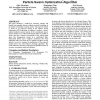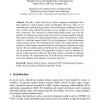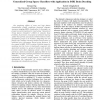160 search results - page 30 / 32 » Improving Probabilistic Automata Learning with Additional Kn... |
SDM
2007
SIAM
13 years 8 months ago
2007
SIAM
The problem of combining the ranked preferences of many experts is an old and surprisingly deep problem that has gained renewed importance in many machine learning, data mining, a...
GECCO
2007
Springer
14 years 1 months ago
2007
Springer
This paper introduces a method for clustering complex and linearly non-separable datasets, without any prior knowledge of the number of naturally occurring clusters. The proposed ...
IWSDS
2010
13 years 5 months ago
2010
Recently various data-driven spoken language technologies have been applied to spoken dialog system development. However, high cost of maintaining the spoken dialog systems is one ...
CVPR
2011
IEEE
12 years 11 months ago
2011
IEEE
The perplexing effects of noise and high feature dimensionality greatly complicate functional magnetic resonance imaging (fMRI) classification. In this paper, we present a novel f...
IROS
2007
IEEE
14 years 1 months ago
2007
IEEE
— Any system that has the capability to diagnose and recover from faults is considered to be a fault-tolerant system. Additionally, the quality of the incorporated fault-toleranc...



